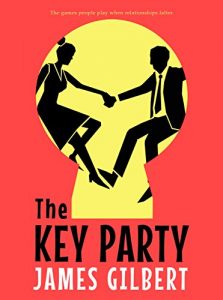The 1950s are remembered as the “happy days” of the 20th century, when families were intact, religion was a salient motive in people’s lives, juvenile delinquency seemed the worst sort of crime and alcohol was the drug of choice. All the national statistics seemed to bolster this impression — a high birth rate, declining divorce and a marriage proportion that made the single adult the odd person out and potentially disruptive. Of course, there was the ominous shadow cast by the Cold War, but if anything, that just intensified the local focus and inwardness of life.
THE KEY PARTY is a comic-serious satire set in this suffocating world, amid the doubly claustrophobic routine of golf matches, weekly bridge games and Saturday night cocktail parties. Four couples, living along a street adjacent to a golf course, have intertwined relationships based upon their proximity and their similar interests. From the outside, their marriages seem placid and happy, but in fact, a better depiction would be monotony and predictability with an undercurrent of anger and dissatisfaction.
One evening, at a cocktail party celebrating the wedding anniversary of one of the couples, this simmering discontent boils over, and the group makes a collective decision — out of boredom and the urges of alcohol — that has extraordinary and unexpected consequences for all of its members and for the small town in which they reside.
THE KEY PARTY is a comic-serious satire set in this suffocating world, amid the doubly claustrophobic routine of golf matches, weekly bridge games and Saturday night cocktail parties. Four couples, living along a street adjacent to a golf course, have intertwined relationships based upon their proximity and their similar interests. From the outside, their marriages seem placid and happy, but in fact, a better depiction would be monotony and predictability with an undercurrent of anger and dissatisfaction.
One evening, at a cocktail party celebrating the wedding anniversary of one of the couples, this simmering discontent boils over, and the group makes a collective decision — out of boredom and the urges of alcohol — that has extraordinary and unexpected consequences for all of its members and for the small town in which they reside.












